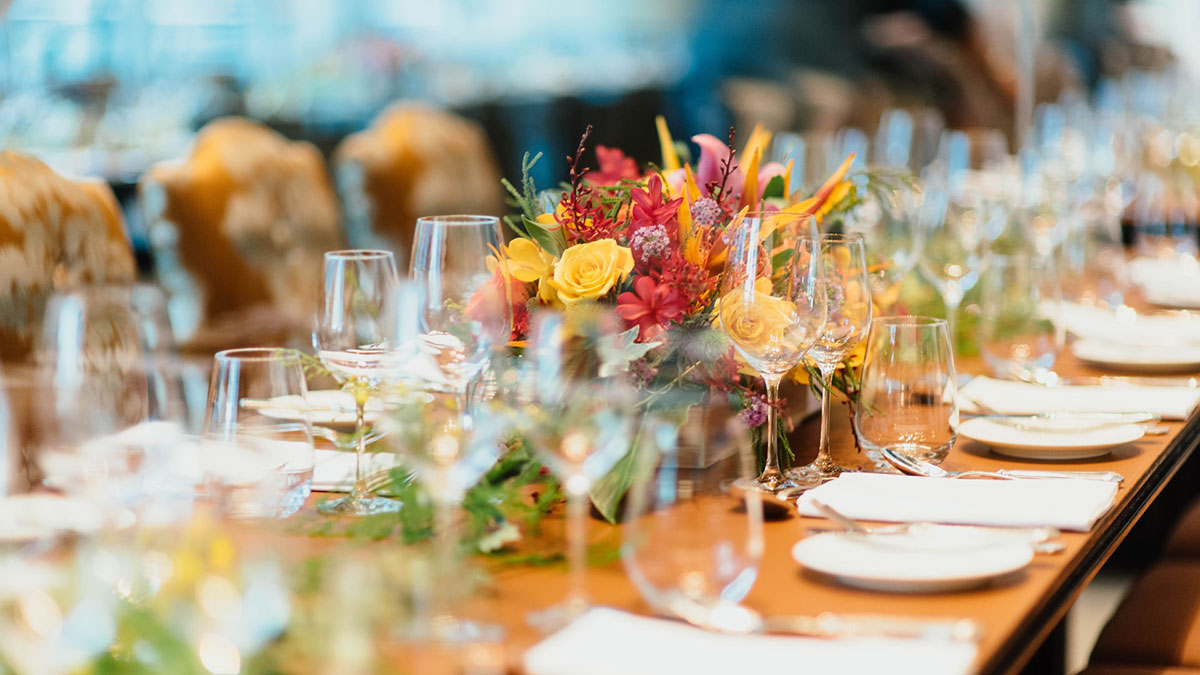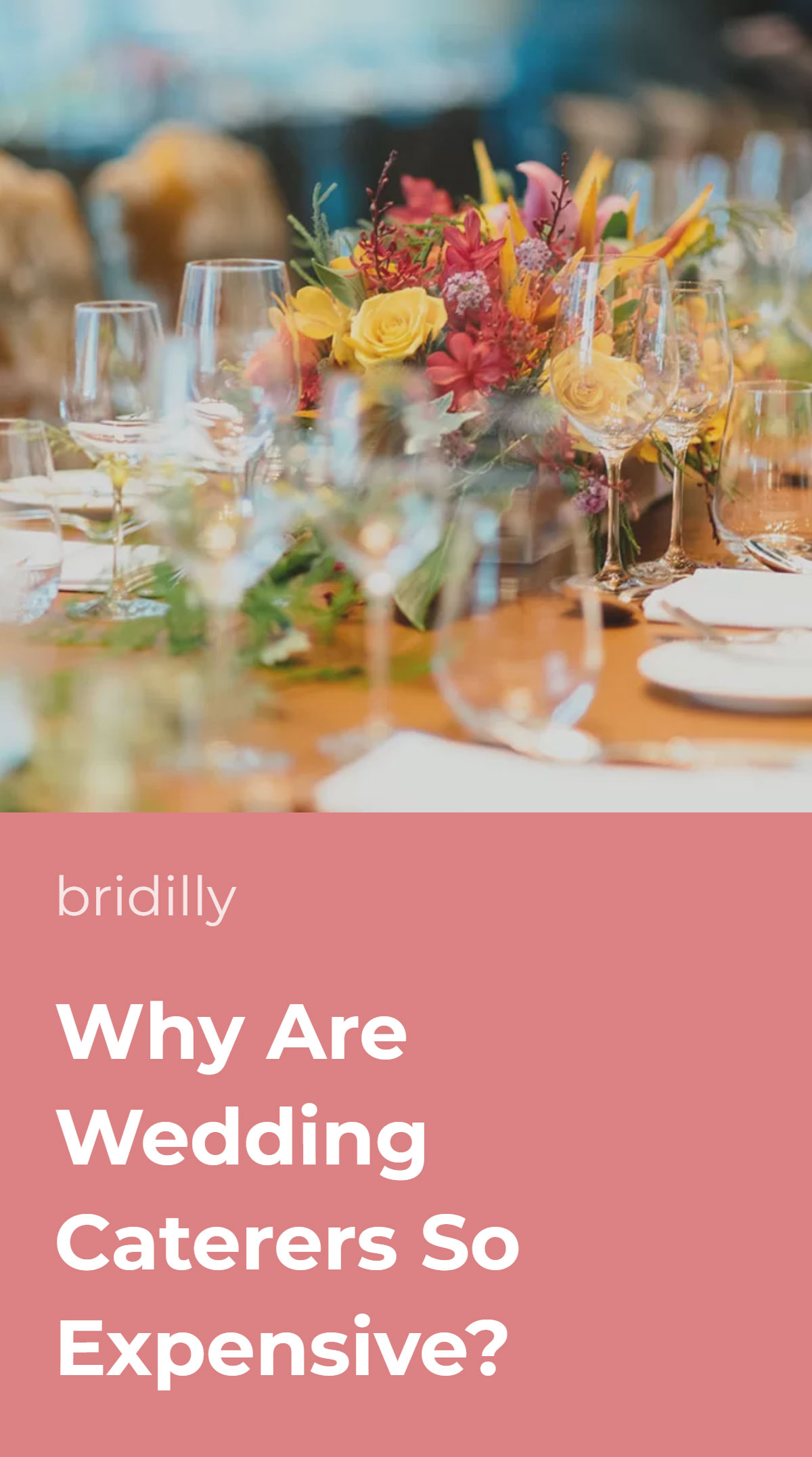It’s mind-boggling how expensive a wedding caterer service can be.
According to the latest data, the average cost of wedding catering in the US is $3,500 for 50 guests.
And that’s only a tiny portion of all the event expenses you need to budget for.
While the cost of wedding catering may seem sky-high, it can be easily explained. Firstly, you need to cover basic expenses such as food ingredient shopping, delivery costs, and tableware rental.
Secondly, wedding catering is provided by an immense number of professionals. They need to be paid for their services.
The work of some staff members isn’t visible to the couple and guests but is not less important than the work of waiters serving food during the reception.
Thirdly, some caterers offer additional services such as design and decoration, entertainment, and bartending. Again, it would be best to determine how much each of these services costs and whether they are necessary for your wedding.
Lastly, a wedding is a memorable day that elevates the catering standards. Food tends to be more luxurious, serving more exquisite, and planning more meticulous compared to any other event.
Table of Contents [show]
Discussion
The wedding catering service doesn’t start at the event itself. Instead, it begins when you first meet the catering manager to discuss your options and get a quote.
Wedding reception planning tends to be a big deal that requires close attention to detail.
Even the most casual wedding often involves numerous menu proposals, revisions, and amendments. You’ll also likely want to try the food options offered, and a trial dinner isn’t free either.
Preparation for a wedding typically involves more than one discussion. Even if you don’t meet the manager in person, you’ll likely communicate with them by phone or e-mail. Digital replies also take time and effort, and time is money.
While the catering manager meets one client, they have to deny meetings with other potential clients.
There’s no guarantee that the client will hire that particular catering service, though. Any losses must be compensated at an account of successful contracts.
Apart from communication with the couple, a catering manager must coordinate with the venue and related professionals. The time spent on this may not be visible to the bride, but it must be compensated.
Preparation
Preparation for the wedding reception takes more time than the reception lasts. This is because the catering specialists must purchase necessary ingredients and cook numerous meals.
Therefore, the more significant is the wedding, the more time the preparation takes.
But the preparation process isn’t limited to cooking. It also involves designing a menu, table set-up and decoration, coordinating everything with catering company staff and the venue.
While every wedding caterer does not offer all these elements, each additional service takes time and comes at a price.
If your chosen catering service offers table set-up and design, be prepared to pay extra for furniture rent and decorations.
Even if your venue provides the tables and you buy decorations yourself, this process involves intense labor.
Serving
Food serving is one of the primary purposes of a catering service. Moreover, fine dining serving isn’t about putting food on plates and handing it to guests.
Instead, it involves table décor, correct placement of tableware, timely beverage replenishment, and food presentation. Even the way waiters clean up tables after dinner matters.
A wedding sets high standards for every catering element that may not be expected at more casual events. That’s especially relevant to serving, which must follow etiquette best practices and be visually appealing.
Food serving at weddings requires a certain degree of knowledge and experience from catering professionals. So, experts in the field typically charge more than newcomers, which is fair.
As a result, if you want to receive impeccable customer service and elegant table and meal design, don’t try to save on professional wedding catering.
Food Delivery
Unless your wedding venue provides a catering service, the food must be delivered to the event. Delivering a fast-food order to your door is one thing; delivering a fine dinner for 100 guests is a whole different story.
The food must remain fresh during the delivery. It must be packed in special cooling bags or portable fridges that aren’t cheap.
The food also shouldn’t spill or mix, so every meal must be packed separately. This requires much more resources and time than you may imagine.
You likely didn’t order your wedding dinner from the nearest restaurant either. Most brides have criteria different than location when choosing the catering service, such as food quality and pricing.
Thus, the wedding caterers may have to drive a long way to get your food to the venue, which leads to higher vehicle costs.
The delivery expenses can be avoided by opting for a venue that has in-house catering. However, not any venue offers catering quality comparable to that of top-rated restaurants.
Furthermore, the price of other services included in catering may be even higher.
Number of Guests
Data shows the average number of guests at a wedding in the US is 178. That’s significantly more than most of us would invite for a birthday party. The more guests you expect at a wedding, the costlier is the catering service.
A high number of guests is directly linked with high food ingredient costs. Caterers also need to arrange more tables, tableware, and decorations.
The most significant part of the money you pay doesn’t go to the catering professional pockets but rather to compensate for these basic expenses.
To ensure every guest receives the same level of service, the wedding catering company must organize enough staff members.
Unsurprisingly, this also raises the final price of wedding catering. And the more food is cooked and served, and the more time is required to clean up afterward.
I can go on, but you get the idea. The increase in the number of guests inevitably leads to a rise in expenses, often disproportionally.
While you can save on buying food ingredients in bulk, the cost of labor, tableware, and decorations counteracts these savings.
Luxurious Food
A wedding is an exceptional occasion, so the food must conform to the elevated standards. In addition, most marriages are considered formal events that require a sophisticated menu involving luxurious ingredients.
Exclusive champagne, truffles, fresh oysters, and foie gras cannot be purchased in bulk or at your local grocery store.
But, naturally, you don’t have to choose the most lavish dishes on the menu. But a 300-guest wedding with plated reception demands something more intricate than hotdogs.
That’s not to say hotdogs aren’t suitable for some weddings. Inexpensive food is excellent for an informal self-cater wedding. The core objective is to find a menu that’s appropriate for the event style.
An experienced and honest wedding caterer can help you to save on food with creative planning. For instance, if crabs are a must, you can choose jumbo lump crab instead of more expensive backfin crabmeat.
Staff
Wedding catering is organized by numerous professionals whose work isn’t always visible to the couple. The people involved in wedding catering include event planners, supervisors, chefs, servers, dishwashers, and designers.
That’s only the essentials. Depending on the wedding size and formality degree, you may also need to hire a hostess, multiple bartenders, or other additional staff.
Wedding caterers start working long before the event. Each step of your communication is labor. The venue preparation is labor. Food delivery – labor.
You can’t estimate the cost of wedding catering based only on resource expenses. Catering professionals must get some profit from their work, too.
Some catering professionals spend years learning new cooking techniques or fine dining serving rules.
Education is expensive, so skilled professionals justifiably charge higher rates. Plus, professionals working with food must regularly obtain safety certifications.
Add-Ons
Finding out what’s included in the wedding catering package in advance is crucial for calculating your budget and predicting expenses.
Some add-ons offered by the catering company may be cheaper than the same services ordered from a third-party contractor.
In other cases, these add-ons may be included in the price by default but not needed for your event, resulting in unnecessary expenses. Either way, you may want to research alternatives options to ensure you aren’t overpaying.
Does the wedding caterer offer tableware and furniture rental? Do they hold a liquor liability license and provide bartending services? Can they offer any entertainment?
Learn about all the available services and packages before signing your contract.
A common add-on is wedding menu tasting. While it can be constructive in choosing the best dishes, this service usually comes at a hefty price tag.
Cleaning Up
Wedding catering doesn’t end when the guests leave. For many catering staff members, the job only starts.
All dishes must be cleaned and leftovers disposed of. The tables must be allocated in their usual position or handed back to the rental company. Decorations must be removed.
This process involves intensive labor, which isn’t seen but is just as important as the work of waiters and bartenders.
Emotions
A wedding is a special day that imposes high pressure on many brides. All caterers know how emotionally vulnerable a woman is before the wedding.
Thankfully, only a tiny portion of them takes advantage of it by charging higher prices for the same services they offer for other events.
Research can help to determine whether the requested price is adequate for your area.

















No Comments Add one
Leave a Comment